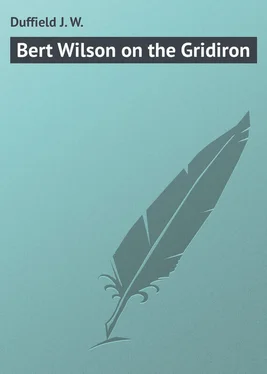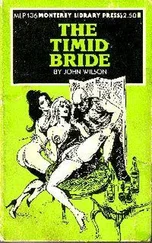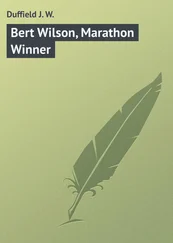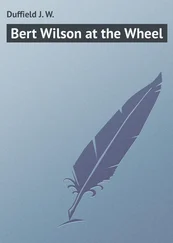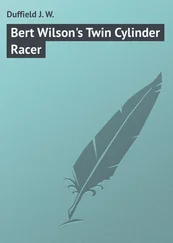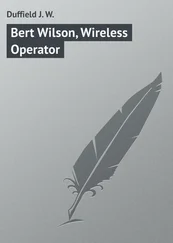J. Duffield - Bert Wilson on the Gridiron
Здесь есть возможность читать онлайн «J. Duffield - Bert Wilson on the Gridiron» — ознакомительный отрывок электронной книги совершенно бесплатно, а после прочтения отрывка купить полную версию. В некоторых случаях можно слушать аудио, скачать через торрент в формате fb2 и присутствует краткое содержание. Жанр: foreign_prose, foreign_children, foreign_language, на английском языке. Описание произведения, (предисловие) а так же отзывы посетителей доступны на портале библиотеки ЛибКат.
- Название:Bert Wilson on the Gridiron
- Автор:
- Жанр:
- Год:неизвестен
- ISBN:нет данных
- Рейтинг книги:4 / 5. Голосов: 1
-
Избранное:Добавить в избранное
- Отзывы:
-
Ваша оценка:
- 80
- 1
- 2
- 3
- 4
- 5
Bert Wilson on the Gridiron: краткое содержание, описание и аннотация
Предлагаем к чтению аннотацию, описание, краткое содержание или предисловие (зависит от того, что написал сам автор книги «Bert Wilson on the Gridiron»). Если вы не нашли необходимую информацию о книге — напишите в комментариях, мы постараемся отыскать её.
Bert Wilson on the Gridiron — читать онлайн ознакомительный отрывок
Ниже представлен текст книги, разбитый по страницам. Система сохранения места последней прочитанной страницы, позволяет с удобством читать онлайн бесплатно книгу «Bert Wilson on the Gridiron», без необходимости каждый раз заново искать на чём Вы остановились. Поставьте закладку, и сможете в любой момент перейти на страницу, на которой закончили чтение.
Интервал:
Закладка:
"There were only two men in his way, and they made the mistake of keeping too close together, so that, as Lamar neared them, he made a superb dodge and slipped by both of them at once. Now he had a clear field before him, but with forty yards yet to go.
"How he ran! He had lost some time in the dodging and twisting, and now the whole Blue eleven were thundering at his heels. He could hear their panting as they sought to close in on him. The nearest one was not more than five feet away. He let out a link and fairly flew. The white lines of the field fell away behind him. One more tremendous effort by pursuer and pursued, and just as eager hands reached out to grasp him, he flashed over the goal line for a touchdown. Suddenly, brilliantly, inconceivably, the 'Greys' had won the game.
"Were we sore? We felt like draping the college buildings with crepe. To have had victory right within our reach and then to have had it snatched away in that fashion! Poor old Peters was fairly sick over it. I suppose to this day he has never forgiven himself for that sportsmanlike instinct.
"But nobody blamed him. The crowd took their medicine. Strictly speaking, I suppose it was foolish. As was said of the charge of the Light Brigade that 'it was magnificent but it was not war,' so, no doubt, many thought of Peters' move that although generous it was not football. Still the finest things in human life are often the 'foolish' things. At any rate, it enriched the history of the game with one of the most dashing and spectacular plays ever made.
"Those pesky 'Greys'," he mused. "They were always doing things like that. They had a fellow once that was always starting the fireworks. Poe was his name – a relative, by the way, of Edgar Allan Poe. I remember once, when with just one minute left to play and the ball thirty yards from our goal line, he dropped back for a kick and sent the ball sailing over the line for the goal that won the game. You've heard no doubt the song that the gloating 'Greys' made to immortalize a run down the field that he made on another famous occasion:
& never mortale Manne shall knowe
How ye Thynge came about —
But from yt close-pressed Masse of Menne
Ye Feet Balle poppeth oute.
& Poe hath rushed within ye Breache —
Towards Erthe one Second kneeled —
He tuckes ye Balle benethe hys Arme,
& Saunteres down ye Fielde.
Ye Elis tear in fierce pursuite;
But Poe eludes yem alle;
He rushes 'twixt ye quyvverynge Postes
& sytteth on ye Balle.
But Arthur Poe hathe kyckt ye balle
(Oh woefulle, woefulle Daye.)
As straighte as myghte Dewey's Gunnes
upon ye fyrste of Maye."
"They're foemen worthy of our steel, all right," laughed Dick.
"All the more credit in licking them," chimed in Tom.
"The percentage is on our side, after all," added Bert. "We've won about two-thirds of all the games we have played together."
"Some funny things happen in the course of a game," went on Mr. Quinby, who in this congenial company was feeling the years drop away from him and was enjoying himself immensely. "I remember once when our boys played Trinity in Hartford. At that time, the woolen jersey was part of the regulation football suit. This made tackling too easy, as one could get a good grip on the jersey, especially after it had been stretched in the course of the game. There had been some talk of substituting other material for it, but nothing had been done. You can imagine our surprise then when, on the day of the game, the Trinity men came out on the field in a full uniform of canvas. It was stiff and shiny and you couldn't get a good grip on it to save your life. That was bad enough, but, in addition, the Trinity boys had covered their uniforms with grease. Our fellows didn't tumble to it until after the game was under way and the enemy were wriggling away from us like so many eels. It was a time for quick thinking, but the Blues rose to the occasion. They sent out a hurry call for a bag of sand, and when it came, they grabbed handsful of it and so were able to get more or less of a grip on their slippery opponents. A rule was made later on forbidding the use of grease. The canvas uniforms, however, proved so much superior to the older style that it was officially adopted and has been in use ever since."
"How did the trick work?" asked Ralph. "Did they get away with the game?"
"No, we beat them all right, but by a close score and it certainly played hob with our tackling and interfering.
"Speaking of tricks, I remember one played by the Carlisle Indians. In addition to being crack football players, those 'noble red men' are about as smooth propositions as you'll find anywhere. The bland Ah Sin was a piker compared with them. You have to keep your eye peeled all the time. They were playing Harvard and the Indians got the ball on a kick off. There was a scrimmage, and when the crowd was untangled, the ball had disappeared. Suddenly, Dillon, of the Indians, darted out and made for the Harvard goal. But he didn't have the ball under his arm, and, after starting in pursuit, the Harvard boys thought it was a mere feint to draw them after him and turned back to see who really had it. Dillon went 105 yards down the field, running like the wind, and crossed the Harvard goal for a touchdown, and then they saw that he had the ball. And where do you think it had been all the time? Tucked up the back of his jersey. It had been enlarged especially for that purpose before the game began, and the first chance they had they worked the trick. The Harvard fellows raged, but there was nothing in the rules to forbid it and the touchdown counted. Since then the rules have been amended, and now the ball has to be in sight outside the clothing."
"He must have had a hunch that he would win," murmured Tom.
"Yes," assented Mr. Quinby. "A hunch on his back and a hunch in his heart. The Harvard boys had to stand for an awful joshing on the way they had been outwitted by 'Lo! the poor Indian with untutored mind.'
"But brain work and quick thinking aren't confined to the redskins. I recall a game played between the Army and Navy. You know there's always a fierce rivalry between those branches of Uncle Sam's service, and this game was being played for all it was worth. The Army had the ball and the fullback punted it to the center of the field. The Navy quarter tried to make a fair catch, but it slipped from his fingers. The Army center had run down under the kick and was close to the ball when it fell to the ground. The Navy men were so close behind that they would have piled on top of him if he had stooped to pick up the ball. So he kicked the ball ahead of him, following it up and ready to reach down and pick it up the minute he had the chance. But the Navy was so close that he had to keep dribbling it along and he kept this up until with one last kick he sent it over the goal and fell upon it for a touchdown. It was a new wrinkle in the game, and one of the hardest things in the world to get away with. They've tried it repeatedly since, but that feat of the Army man still stands as the star play of the 'dribbling' game.
"A good deal of the rough stuff has been cut out of the game and I'm glad of it, but in my college days almost everything 'went,' provided the referee wasn't looking. There was a lot of slugging and jiu-jitsu work, and more fellows had to be taken out of the game because of injuries than at present. Often a concerted effort was made to 'get' some especially efficient man on the other side, and they weren't always scrupulous about the way they did it. I remember one time we were playing a big game, and 'Butch' Allaire, the best player on the Blue team, had his knee badly hurt. We were short of good substitutes, and he felt that he had to continue playing, if it were at all possible. So, after a short wait, he came limping out again to his position, with a white bandage tied round his knee outside his uniform. To the other side, that bandage was like a red rag to a bull. They lunged against him, piled on top of him, and in every scrimmage they pressed heavily on that wounded knee. But, despite all their efforts, he played out the game, and we came out winners. After the excitement was over, the captain said to him:
Читать дальшеИнтервал:
Закладка:
Похожие книги на «Bert Wilson on the Gridiron»
Представляем Вашему вниманию похожие книги на «Bert Wilson on the Gridiron» списком для выбора. Мы отобрали схожую по названию и смыслу литературу в надежде предоставить читателям больше вариантов отыскать новые, интересные, ещё непрочитанные произведения.
Обсуждение, отзывы о книге «Bert Wilson on the Gridiron» и просто собственные мнения читателей. Оставьте ваши комментарии, напишите, что Вы думаете о произведении, его смысле или главных героях. Укажите что конкретно понравилось, а что нет, и почему Вы так считаете.
